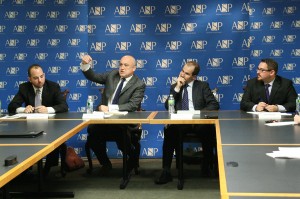 The American Security Project hosted a roundtable discussion on Counterinsurgency in Afghanistan and prospects for the nation’s future following the 2014 withdrawal of US and NATO forces. The event, moderated by ASP Fellow Joshua Foust , brought together three counterinsurgency experts: Matt Freear, Nick Lockwood, and David H. Young for a substantive discussion on the successes and failures of US-NATO strategy in Afghanistan, and what can be expected in the short-term for the nation.
The American Security Project hosted a roundtable discussion on Counterinsurgency in Afghanistan and prospects for the nation’s future following the 2014 withdrawal of US and NATO forces. The event, moderated by ASP Fellow Joshua Foust , brought together three counterinsurgency experts: Matt Freear, Nick Lockwood, and David H. Young for a substantive discussion on the successes and failures of US-NATO strategy in Afghanistan, and what can be expected in the short-term for the nation.
Matt Freear, drawing on his experiences in Helmand Province, stressed that the US has learned a great deal in Afghanistan at the technical level, but has yet to apply this understanding at the strategic level in a manner consistent with realistic expectations. Citing the direction of the public debate on Afghanistan, Freear noted that a critical challenge the US faces is maintaining the support of both the American and Afghan people. Concerns about civil war and governmental collapse following the 2014 exit are valid, and there is a clear need to “build governance over government” in order to empower institutions over personalities.
Despite the fast-approaching exit date and significant challenges still facing Afghanistan, Freear remained cautiously optimistic about the outcome of the war. However, he stressed, it is critical that the US elevate its understanding of the conflict from the technical to the strategic level and learn that there are “very real parameters” to what can be achieved in a specific environment.
Having worked in both counternarcotics and on reintegration of the Taliban into the Afghan government, Nick Lockwood presented a sobering outlook for Afghanistan’s future. Lockwood asserted that counterinsurgency in Afghanistan would have been a good idea, but remained unsure whether such a strategy was actually implemented. Drawing extensively from his own experiences in Helmand, he noted US institutions are designed to converse with elites and not the general population, as is required by counterinsurgency strategy. There has been too much focus on development initiatives and not enough on achieving security. Consequently, one sees that, in particular, rural areas of Afghanistan are presented with a choice between self or local governance or Taliban governance, as opposed to a central authority.
Additionally, Lockwood explained that 60-90% of Afghanistan’s finances come from the US, raising the question: what happens when US forces withdraw in 2014? Like Freear, Lockwood expressed concern for how long US domestic support for efforts in Afghanistan can be sustained, noting that when the money for Afghanistan dries up, the country ability to function will be hindered.
David Young stressed that ultimately, everything in Afghanistan is done on a local level, including security. Prior to the war, Afghanistan relied heavily on local militias to maintain security and provide justice. However, when the US and NATO initiated large-scale, highly organized operations in Afghanistan, these militias disbanded, having found greater financial benefit in joining the government or securing contracts. Looking ahead to 2014, Young foresees a return to local security forces with the possibility of civil war in the East and South of the nation, instigated by Kabul in an effort to keep the conflicts from entering major population centers.
Initially noting that counterinsurgency has become a “dirty word” over the last several months, Foust reiterated the panel’s opinion that securing Afghanistan remains a preeminent challenge as the war draws to a close. A lively discussion followed the panelists’ presentations, covering a range of subjects from the importance of Pakistan and Central Asian nations in Afghanistan’s future, distribution of resources, and the possibility of restructuring the Afghan Constitution. The event wrapped on the note that the US needs to consider what “winning” the war in Afghanistan really looks like, and in retrospect, whether its strategy was successful in achieving the objective of stabilizing the nation.


